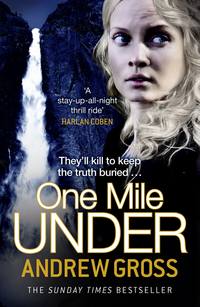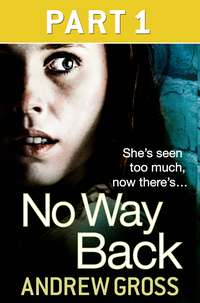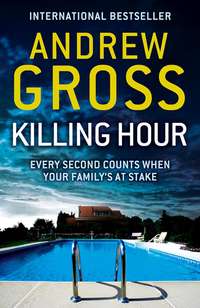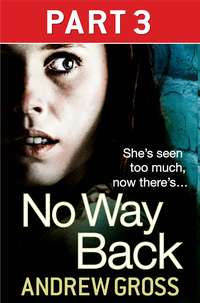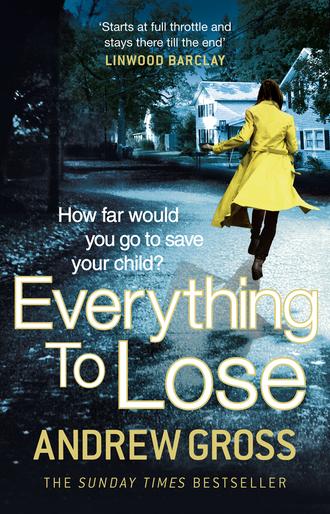
Полная версия
Everything to Lose
“Don’t worry about it. I can see you’ve got your hands full. Something will come up. Always does, right?”
I picked up my bag and made my way to the door.
“Hey, Hil …”
I turned, praying inside he’d had some change of heart and come to his senses; some realization of what he was putting me through.
Jim winked, holding Luke upside down. “You’re looking good, Hil. You really are.”
I knew if I didn’t get out of there now, I was going to cry.
CHAPTER FOUR
Back in my car, any semblance of control completely broke down. Tears filled my eyes even before I put the key in the ignition. I could take the whole new family thing—Jim playing überdad—even though it did eat at me where the hell he’d been for the last four years with Brandon. I could even take the spanking-new Porsche, which alone would have paid a couple of years of tuition.
What I couldn’t take was that he’d basically just washed his hands of us. When he could see I was falling. How could you just look at me and say that, Jim? I put my head against the wheel and shut my eyes. About your own son?
It was clearly all on my shoulders now.
I started the car and it took everything I had not to ram it headfirst into Jim’s Porsche and leave it a mound of crumpled steel. I backed out of the driveway and almost made a U-turn a block away, then regretted that I hadn’t.
You could sue his ass, Hil, I said to myself as I drove. There were deadbeat laws. No judge in the world would side with him. But I knew Jim’s assets in his own name might even be less than mine. He was probably down to his ski jacket and a pair of Cole Haans.
And that would all take time. And lawyer’s fees. Money I didn’t exactly have right now. Even if there was something left to take. Whatever was left was surely now in Janice’s name.
What I had to do was figure out how to get through the next two months.
I put the radio on, 1010 WINS news. A Pakistani minister had been blown up in a suicide attack. Residents of Staten Island were still angry over delays in storm relief. Something about a Connecticut politician whose wife had tragically drowned on a family vacation in South America. I winced, suddenly aware of my own blessings. Whatever I was going through, at least Brandon was healthy and alive.
It was 7:36. I’d promised Elena I’d be back by eight. Two things were going around in me.
First, that I would do anything for my son. Anything. Whatever it took.
Any mother would.
And the other, my mind drifting to the satchel in the woods, was that I’d already made enough bad choices that had put me in this situation.
So what was one more?
Which was basically what I was dwelling on when I realized I’d already driven past the highway and was headed back toward the accident site.
As I got near, the road narrowed to a single lane, yellow police tape now marking off the site. Three county police cars and a tow truck were there, all kinds of lights flashing.
I slowed. I couldn’t see if the Honda had been removed. It seemed that it hadn’t. I figured there had to be all kinds of people getting things together down there. With everyone traipsing around, who knew if the satchel hadn’t already been discovered?
Who knew if now they were looking for the person who had flung it there?
I went over what I’d told Rollie. “I’m Jeanine …” That was all. No Hilary. No last name. I knew I’d touched a couple of things—the car doors, the victim’s cell phone—but even if they were able to remove my fingerprints, they certainly weren’t anywhere in the system. Nerves suddenly wormed their way through my stomach on whether, if it came to it, Rollie could have ID’d my car.
No. I was sure. I’d parked a ways down the road.
I felt pretty safe.
Which didn’t completely eliminate my fear that the part of the county police force that wasn’t currently on site here would be waiting for me at my house.
They weren’t. Though I did let out a sigh of relief as I drove up the cul-de-sac Jim had developed and into my driveway. Only Elena was there, putting on her coat when she heard me come in through the kitchen door.
“How was he?” I asked, coming in from the garage.
“Eezy tonight, missus.” Her English wasn’t exactly the best, but she was devoted to Brandon and indispensable to me. Not to mention that my son adored her. “Heez in the bed.” She grabbed her bag. “I be in tomorrow at ten. And don’t worry, I pick him up at school.”
“Elena …” I was trying to decide how I should tell her. That I was going to be around for a while. That I had no idea how long I could keep her on, with her present hours. She was like part of the family to me.
“Sí, missus …?” She looked at me with those round, trusting eyes.
“Nothing. I’ll probably be here in the morning, okay?” I knew there had to be some kind of explanation. “Drive home safe.”
She smiled brightly. “Good night, Miz Cantor.”
I closed the door behind her and went through the large brick-and-glass neoclassic Jim had constructed, which was now buried in debt. I had tried to refinance it for years and pull out whatever equity I still had in it, but with home prices still down and Jim’s credit a mess, it simply wasn’t in the cards. Since Jim’s name was still on the note, he was supposed to pick up half of the $1.6 million, interest-only debt, $4,290 a month, a parting gift from the days when lenders were throwing loans at his business. Even though rates had dived in the past year, now I’d have to disclose that I no longer had a job and that Jim’s company had closed. God only knew what workout committee that would put me in. I was scared I could lose the house. In today’s market, the place might go for only 1.6, $1.7. The truth was, I couldn’t leave and I could no longer afford to stay. As it was, I was only praying that some loan officer wouldn’t be reviewing the loan and call me to tell me they were foreclosing.
“I’m home, Brand!” I shouted into his room. “I’ll be up in a minute …”
I went up to my bedroom. High ceilings, a Palladian window overlooking the pool. Which last year I didn’t even open in order to save on the cost. I pulled off my sweater and jeans and threw on the pajama bottoms and yoga T-shirt I usually crawled into bed with. In the bathroom, I pulled my bangs into a scrunchie and took off my makeup. I had short brown hair, a small nose, and wide hazel eyes that I worried were starting to show the strain of everything. I was only thirty-six, had always been told I was pretty, Natalie Portman pretty. But my days of wishing for some handsome knight were over. Everything was all in my hands now.
I went into the kitchen and put on some water for tea, then back down the first-floor hall to Brandon’s room. He was curled up in his bed, playing on his iPad. A design app called FLOW, which always intrigued him, muttering, “Tie, tie, tie, tie …” to himself, which he often did when he was in his own world.
“Hey, guy.” I sat on the corner of his bed.
He didn’t answer, just kept swirling the colorful arrows on the app with his index finger.
“Cool design!” I curled up on the bed next to him.
I always said there were two of him: Sweet Brandon and Mean Brandon. Mean Brandon was where he would say to people who were averting their eyes, “I want to cut off your head.” No matter how many times I took him aside and scolded him, telling him that it was totally inappropriate. When he was four we had a dog, but I had to get rid of it because Brandon once tried to cut off its tail.
There was a time a few years back when I was really worried about him. Who he was inside. Who he would grow up to be. I’d read about these children with what they called C-U tendencies. Callous and unemotional. Kids who seem to carry the gene or the early dispositions that turn them into psychopaths. At times Brandon showed some of the signs. I read about things like the Child Psychopathy Scale and the Inventory of Callous-Unemotional Traits and the Antisocial Process Screening Device. In a particularly defiant stage, I even had him tested. But when everything was in, Brandon tested within only one standard deviation from the norm. Nothing to worry about, I was told.
Sweet Brandon won out.
“Tie, tie, tie, tie, tie …,” he droned to himself. I leaned down and stroked his hair.
Then all of a sudden: “Where were you?”
At times his questions seemed to come from out of nowhere.
“I was just out, hon. On some business.” No chance in the world I would tell him that I was with his dad. “What’d you do tonight?”
He didn’t answer, just kept swirling his finger around on the screen, making his squiggly designs. “I heard you tried to teach Elena how to play.”
No response. Only a shrug.
“How did that go?”
He just kept swirling. “She doesn’t even know what an app is, Mom.”
“You remember, I didn’t either not too long ago. Any homework?”
“Some math. And I had to do some sentences. They were boring.”
“Well, one day you’ll realize that what seems boring now is when you actually learn something …” He didn’t look up and this time I couldn’t even blame him. I couldn’t believe I’d actually said something that trite and parental. I laughed at myself inside.
Once I came home and found him playing happily in the tub. These clumpy brown objects, floating amid the suds. At first I thought they were just some plastic toys he’d brought in. Until I realized in horror what it was. Feces. Brandon’s own. He was smeared in it, having the time of his life. He could also beat his head against the wall if he didn’t get his way. And bite his nails down until they bled. Luckily, a lot of this was in the past.
Before Milton Farms.
Now most of the antisocial behavior seemed to be under control.
“C’mon, let’s climb into bed,” I said, taking the iPad away, praying that he wouldn’t grab for it back and act up. I couldn’t handle that tonight.
But tonight he was Sweet Brandon.
He said, “I did a drawing. Wanna see?”
“How about I look at breakfast tomorrow? Right now it’s late.”
“I want to show it to you.” He jumped out from under the covers, went over to his desk, and brought back his sketchbook. He could draw anything. He had a gift. He just saw things that way. The sketchbook was basically filled with the same kinds of drawings. Monsters and underworld creatures that looked as if they had crawled out of someone’s ghoulish imagination. Mean Brandon, maybe. At first I was concerned. With how he acted sometimes and what was clearly going on in his imagination. It was all pretty dark. And always the same things: these creatures. But the doctors all said it was just a sign of a fertile imagination and not to worry. This one had a horse’s snout, the extended ears of an elf, two legs, scaly skin, and malevolent devilish eyes.
“Jeez, Brand, where do you come up with these things …?”
“He’s called Polydragon. Someone at school said my brain is in another dimension.”
“You’re not in another dimension, Brand …” I took the sketchbook and laid it on the table, wrapped the covers back around him, and cuddled closely. “You’re here. With me. I know that I’m not in another dimension. So you can’t be either. Sorry, dude. Maybe once you could draw a picture of the house. Or me.”
“I guess I could,” he said. “But that would be boring.”
I snuggled close to him. “Not to me.”
He smelled so sweet, the purity of everything that I imagined was good in his soul, that would one day come out. For years he barely uttered a word. He’d ask for things by pointing; he wouldn’t let go of crayons or Magic Markers. He’d simply grunt, cry, or babble gibberish. We didn’t know what was going through his head. Then one day Jim and I had the TV on, and I said, “I wonder what’s on next.” And from out of nowhere Brandon blurted, “CSI: Miami, Mommy.” We turned, flabbergasted, sure that this would open up a new chapter in our lives.
It was six months before he spoke another word.
Now look at him, drawing, holding a conversation. How could I possibly tell him he might lose it all: his school, his tutors? The only home he’d known.
“Do you ever think of going away?” I asked him, squeezing my arm around him over the sheets.
He shrugged. “I like it here.”
“I know you do. I like it here too. I just meant, if you could go somewhere else, somewhere new. Different. Where do you think it would be? The beach? Like in California. Or the mountains? You remember we went skiing once.”
He paused a while and closed his eyes, and I thought he had drifted off. Then he opened them again. “The North Pole.”
“The North Pole? Wow. That’s interesting. Why there?”
“That’s where the Polydragons live. Underneath the ice.”
“Oh, I see …”
He nodded into my chest, his voice growing sleepy. “But I don’t want to go away, Mommy …”
“We won’t,” I said softly. “It was a silly thing to even ask. I like it just fine here too. With you.”
“Me too,” he said, closing his eyes.
He yawned and I felt him snuggle his face in my chest. “Nighty-night, Brandon.”
He didn’t speak for a while, and I stroked his hair, a tear rolling down my cheek. This is what I had, I realized. All I had. This is what God gave me to protect, to keep safe. To help grow into a whole person so he could one day go out into the world and prosper, which I was sure he would. This wasn’t his fault. He didn’t choose how he was. Life did. And I wasn’t going to let life set us back. With whatever options I still had.
Brandon’s voice trailed off one last time. “I love you, Mommy …”
I drew him close, knowing what I had to do. “I love you too, honey.”
Sweet Brandon.
CHAPTER FIVE
Charles Mirho nursed a bourbon at the end of the bar in Stamford, Connecticut, waiting for the call that never came.
He was supposed to have heard back by nine. That would have given the old man time to get back home and do what he had to do.
But now it was ten fifteen and the phone still hadn’t rung; the two calls he had placed back to him from his throwaway phone had gone unanswered. He was starting to feel pretty certain something had gone wrong.
That or he was being set up—and not even a fool would do that.
Even an old fool.
The local news was on the TV. Something about a four-year-old who had fallen out of an apartment building in Stamford.
It left two options, and either one meant he was going to have to earn the money he was being paid. Mirho had spent three years as a sergeant in the military police before moving into intelligence. His specialty was interrogations. He was the guy they brought in when all the “new age” shit didn’t get anywhere. Not that that assignment lasted long. A couple of drunken brawls and a messy sexual harassment charge got him a general discharge, hastening his new career. Now he was in private practice. With one highly notable but confidential account. His new specialty was digging up dirt on people. Or creating it when there was none.
Though there was always something, if you pulled up the rock and looked under.
Mirho tossed a twenty on the counter, and had gotten up to leave when something on the overhead screen caught his eye.
A car accident. By the looks of it, a bad one. It was the headline that grabbed him.
FATAL ACCIDENT NEAR BEDFORD
IN WESTCHESTER COUNTY
He stopped and said to the bartender, “Mind turning that up, Al …”
“An old-model Honda, with only the driver inside …” was what he heard.
Then the camera zoomed in on the car and Mirho realized things had just gotten a whole lot more complicated.
In the parking lot, his cell phone rang. Mirho glanced at the number. Only one person it could be. He answered, not relishing how it would go. “Mirho here.”
“Do we have it?” the caller asked. Mirho was supposed to have gotten back to him by now as well.
“No, not yet.” Mirho sighed. “There’s been a complication.”
“What do you mean by ‘complication’? You met with him, didn’t you?”
“I met with him,” Mirho acknowledged. He’d worked for a lot of tough men in his day. But this was one who knew how to use the hammer. Someone you didn’t want to be feeding excuses to.
He laid the whole thing out for him as best he could.
“So where’s my money, Charlie?” his boss replied indifferently.
“I don’t know, maybe in a police station somewhere,” Mirho said, until something else occurred to him. “Unless someone got there first.”
“Someone got there first? Well, that wouldn’t be good for business, would it, Charlie?”
Mirho opened his car door. “Or for them.”
“Find that money, Charlie. And more important …”
“I know what’s more important,” Mirho said.
But just to make sure, the caller added, “More important, you find me the rest of what we’re looking for as well.”
Mirho’s father, an oil lease salesman from East Texas, always had a saying that selling didn’t even begin until the customer said no. In this trade, it was more like it wasn’t work until something went wrong.
Mirho shut his door and started up his car. “That’s what you pay me for.”
CHAPTER SIX
The next day I started sending out e-mails to see what might be out there for me. The first was to Steve, my ex-boss, reminding him to keep his antennae up as he had promised. How Brandon and I were in a real bind. Then I started sending them to people in the industry. Some had already heard and were shocked; others offered to help. Finding a new job was Priority Number One.
I tried to put the accident and the money out of my mind.
I poked around the employment sites. Looking at openings for advertising sales managers, media planners, corporate comptrollers. Nothing seemed on the money. I envisioned crowded cattle calls for positions I was totally overqualified for. Going up against young Ivy League grads with resumés far deeper than my own. Standing in lines at job fairs in front of junior-level human resources managers just out of school.
I pulled my old resumé up on the computer. It seemed woefully thin. I updated it for what I’d been doing these past four years, but it still had this pretty wide gap for the time when I’d just been at home being a mom. I even called the admissions director at Milton Farms, hoping I might qualify for financial aid. They loved Brandon there. They’d never let me have to pull him out.
I was told she was at a conference and would have to get back to me.
As much as I tried to ignore it, the thought of last night kept drifting back.
Taking a break, I went online to the local newspaper’s site up there, the Bedford Record Review. I needed to know who the crash victim was. What kind of person was he? A solid citizen? Or dirty? Had I taken someone’s life savings? Or a bundle of cash no one would ever even know was missing?
On the paper’s website, I scrolled past articles on safety in the Pound Ridge Elementary School and one about a Bedford investor who had been bilked out of millions in an insurance scam.
There was nothing on the accident.
Sipping my coffee, I switched over to the Westchester Journal-News, which I knew had a daily police blotter.
The big story of the day was of a Yonkers teenager who’d been eliminated from the TV show The Voice. And something about the second in a series of home break-ins in Chappaqua and Mount Kisco.
I kept scrolling down, passing over dozens of local stories, until under the heading of “More Top Stories.”
Then I saw it: “Fatal Crash on Route 135 near Bedford.”
My heart kind of spurted up, then became still. I told myself that whatever ultimately happened, I didn’t cause what happened to take place and the only reason I’d gone down there was to help. I put down my coffee and clicked on the link.
A man, identified as Joseph Kelty, 65, of Staten Island, New York, was killed last night at approximately 6:40 P.M., when his Honda Civic, driving east on Route 135 between Bedford and Fairfield County, drove off the road and down an embankment, rolling over several times and striking a tree. Mr. Kelty was the only passenger in the car.
Sergeant Neil Polluto, of the Bedford Hills Police Department, said an eyewitness spotted a deer cross the road just before Mr. Kelty’s car began to swerve. It was possible the deceased had been texting at the time of the accident. Mr. Kelty was described as a retired line maintenance manager with the New York City Transit Authority, and it was not known why he was in the area at the time of the accident.
My first reaction was relief. There was no mention of any missing money. No mention of anyone else being on the scene. I’d covered myself well.
My next thoughts were about Kelty. A retired line manager with the New York MTA. I brought back the lifeless, bloodied face. So he wasn’t a criminal. A job like that paid what, I guessed only seventy to eighty thousand a year? So what would he be doing carrying that kind of cash? And all the way up there? In rural Westchester.
I’d promised myself that if the money was legitimate, I’d find a way to get it back.
Fate had intervened. For both of us, I guessed. Before I decide to could keep it, I had to find out as much as I could about him.
I went back to the article.
Funeral services for the deceased are being made through Dellapone Funeral Home in Midland Beach on Staten Island.
CHAPTER SEVEN
That same day two men stood near a construction site on West Forty-fourth Street in New York City, just off Times Square.
One was large, with bushy dark hair in a black leather jacket that he wore open, as if he didn’t feel the February chill. He was devouring a sausage in a bun from a nearby food cart.
The other was in a blue-and-orange New York Knicks jacket, his baseball cap turned backward.
“Seventy thousand dollars is quite a sum,” the large one, whose name was Yuri, said in a heavy Russian accent. “I tell you that Sergei Lukov is patient man. He shows you restraint, out of respect for your circumstances. I think you know what I’m saying, right? But even a starving whore stays at home when her putchko is aching …”
“Meaning what …?” The man in the Knicks jacket put his back against the scaffolding.
“Meaning everyone has their limits,” the burly Russian replied. Then he shrugged. “Maybe the saying was not so good.”
The other man took a sip of coffee. “I think I get the routine.”
“’Course you get routine. Your people invented routine, right? You probably seen this movie a thousand times. Hey—you sure you don’t want one of these?” The Russian showed him the half-eaten sausage that looked small in his meaty palms. “I come all the way from Brooklyn just for these. You’re missing something good.”
“Thanks, but I never eat anything that would have killed me if it was alive.”
Yuri furrowed his brow. “Pig are so vicious over here?”
“Boar,” the man in the Knicks jacket said. “Cinghiale means wild boar. It’s Italian.”
“Oh.” The Russian looked askance at what was left of his sausage and chomped another large bite off nonetheless. “Boar, huh? Anyway, you know it goes up, Thursday. Three days. Eighty thousand then. Pig or boar.”
“Like the national debt.” The man in the cap pointed to the digital sign on a building high above them, the numbers racing. “Except with a Russian accent.”
“Ha! Good one! Except is Ukraine …” Yuri elbowed him good-naturedly. “Back home, you could get knife in skull for that. Or radiation bath. Chernobyl cocktail, we call it. Very popular at home today. Here, Ukraine, Russian … Like pig and boar, no one knows difference. No harm, no worry, right?”





